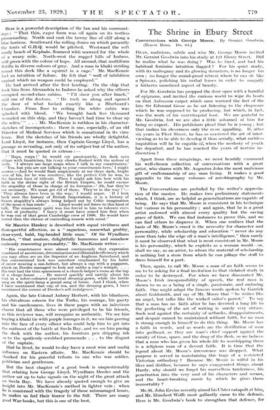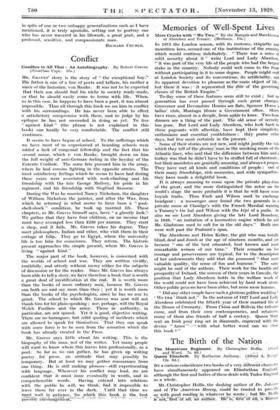The Shrine in Ebury Street
DEAR, malicious, subtle and wise Mr. George Moore invited Mr. Geraint Goodwin into his study at 121 Ebury Street. Did he realize what he was doing ? Was he tired, and had his habitual feminine intuition flagged ? For his quiet study, with its mahogany and its glowing decanters, is no longer his own ; no longer the sound-proof retreat where he can sit like a Spinoza, polishing his verbal lenses in order to magnify a hitherto unnoticed aspect of beauty.
For Mr. Goodwin has propped the door open with a handful of epigrams, and invited the curious world to wipe its boots on that Aubusson carpet which once warmed the feet of the late Sir Edmund Gosse as he sat listening to the eloquence which he was supposed to be producing, but which, in fact, was the work of his ventriloquial host. We are grateful to Mr. Goodwin, but we are also a little ashamed of him for being so expert. His publishers plead that he is young ; but that makes his cleverness only the more appalling. If, after six years in Fleet Street, he has so mastered the art of inter- viewing as to be able to develop it thus serially, what ruthless inquisition will he be capable of, when the modesty of youth has departed, and he has reached the years of mature in- discretion ?
Apart from these misgivings, we must heartily commend his well-chosen collection of conversations with a great artist, who shares with Mr. Augustus John the most malicious gift of craftsmanship of any man living. It makes a good appendix to the many volumes of autobiography by Mr. Moore.
The Conversations are preluded by the writer's apprecia- tion of the master. He makes two preliminary statements which, I think, are as helpful as generalizations are capable of being. He says that Mr. Moore is consistent in his technique but various in his personality ; and again, that he is a great artist endowed with almost every quality but the saving grace of faith. We can find instances to prove this, and we can find others to disprove it. When one realizes that the basis of Mr. Moore's creed is the necessity for character and personality, while scholarship and education " never do any more than take the edge off a man's intelligence," then surely it must be observed that what is most consistent in Mr. Moore is his personality, which he exploits as a woman would—or, shall we say, as an artist, to whom the material of scholarship is nothing but a store from which he can pillage the stuff to dress himself for a part.
Then, again, to call Mr. Moore a man of no faith seems to me to be asking for a final invitation to that violated study in order to be destroyed. For when we have discounted Mr. Moore's Irish irresponsibility of speech, the real man is shown to us as a being of a single, passionate, and enduring faith. One might adapt the famous words spoken by Garrick about Goldsmith, and say of Mr. Moore that " he writes Iike an angel, but talks like the wicked sailor's parrot." To say that a man has no faith after he has devoted a long life to the perfecting of the art of writing is surely very obtuse. Such zeal against the certainty of setbacks, disappointments, and despair cannot be maintained without faith, for no man is strong enough in himself to do this thing. Mr. Moore has a faith in words, and as words are the distillation of man into godhead, as they are man's chief support against the enmity of time, space, and the drag of the flesh, so we believe that a man who has given his whole life to worshipping them is a religious man of a devout faith. It is time that the legend about Mr. Moore's irreverence was dropped. What purpose is served in maintaining this bogy of a restricted Victorian orthodoxy ? Because Mr. Moore is wilful in his likes and dislikes, because he says exaggerated things about Hardy, why should we forget his marvellous tenderness, his penetration into the very soul of his characters and scenes, and the heart-breaking music by which he gives them immortality ?
Mr. k. Johii 1 rvine recently aimedhis -Ulster catapult at him, and ki.'HiiinbeitiVoIre most gallinfiy came to the defenCe: Here is Mr. Goodwin's book to strengthen that defence, for
in spite of one or two unhappy generalizations such as I have mentioned, it is truly apostolic, setting out to portray one who has never wavered in his lifework, a great poet, and a profound, sensitive, and compassionate man.
RICHARD CHURCH.































































 Previous page
Previous page